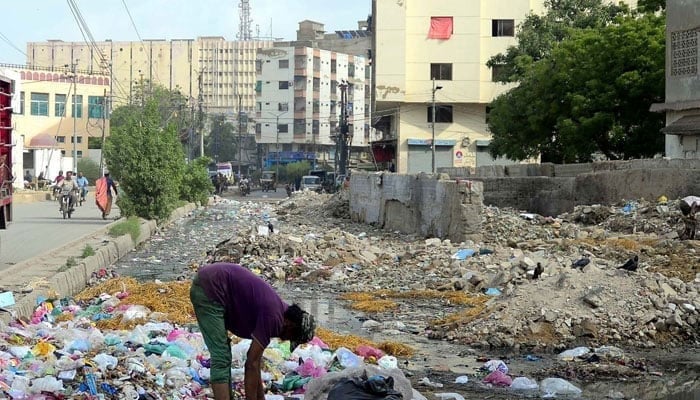The wasteland
People should also take some responsibility and pledge to keep their cities and areas clean
Everywhere we look, there are heaps and heaps of garbage. This is not an exaggeration. In cities like Karachi, almost all residential areas are laced with garbage. Interestingly, while the problem is not as apparent as it is in this part of the world, growing waste is a global challenge. The World Bank warns of a worsening global waste crisis, projecting a 73 per cent increase in waste to 3.88 billion tonnes by 2050, especially affecting low- and middle-income countries where waste collection and management are inadequate. According to reports, 23 per cent of global waste is uncollected and 33 per cent is openly dumped, with far worse conditions in low-income countries. Although per capita waste in these countries is lower, the environmental and health risks from poor management are severe, contributing significantly to pollution, disease and climate change.
The World Bank recommends integrated waste management strategies that include recycling, waste reduction and proper disposal, focusing on inclusive policies that involve informal waste workers and women. International cooperation and funding are critical, supported by global agreements like the Paris Agreement and the Global Plastics Treaty. In Pakistan, unplanned expansion has led to several challenges. As employment options dwindle in small cities, many people migrate to big cities that do not have the infrastructure to accommodate a fast-growing population. Policymakers here have paid zero attention to waste collection and relied on traditional methods of door-to-door collection. In several residential areas, households who try to evade the small monthly fee imposed on garbage collection often miss out on this service, disposing their waste on roads and make-shift garbage collection spots.
The problem requires several well-thought-out steps. First, the government, in collaboration with private players, should encourage recycling. Companies can run a short campaign where people who return their used water bottles or other makeup containers are rewarded. The ban on plastic bags should be extended nationwide with the simultaneous promotion of sustainable alternatives. Road infrastructure should be fixed. We rely on plastic and wrapping materials mostly because of our bad roads. Fixing this could easily solve many of our problems. Some forgotten habits, like milk collection in a container at home, can be brought back to promote sustainable practices. When waste is left on land, it spreads disease among humans and animals. When it is allowed to drain into the sea, it kills marine life. It’s a lose-lose situation for us, and it is on us to act before it is too late. While the main responsibility is on the government to come up with a coherent strategy for waste maintenance (it earlier contracted with third parties for this exercise but payment delays disturb the project; it should now consider engaging local companies with clear targets), people should also take some responsibility and pledge to keep their cities and areas clean.
-
 Why Travis Kelce Says Taylor Swift Has Made Him 'so Much Better'?
Why Travis Kelce Says Taylor Swift Has Made Him 'so Much Better'? -
 Halle Berry Credits This Hairstyle With Launching Her Acting Career
Halle Berry Credits This Hairstyle With Launching Her Acting Career -
 Hailee Steinfeld Spills Her 'no-phone' Rule With Husband Josh Allen
Hailee Steinfeld Spills Her 'no-phone' Rule With Husband Josh Allen -
 Bowen Yang Gets Honest About Post SNL Life: 'It’s An Adjustment'
Bowen Yang Gets Honest About Post SNL Life: 'It’s An Adjustment' -
 Charlize Theron Delivers Strong Message At 2026 Winter Olympics Opening Ceremony
Charlize Theron Delivers Strong Message At 2026 Winter Olympics Opening Ceremony -
 Lil Jon Reacts To Son Nathan Smith's Death: 'Devastated'
Lil Jon Reacts To Son Nathan Smith's Death: 'Devastated' -
 Bianca Censori Reveals Where She And Kanye West Stand On Having Children Together
Bianca Censori Reveals Where She And Kanye West Stand On Having Children Together -
 Taylor Swift Hypes Olympic Athletes In Surprise Video Message
Taylor Swift Hypes Olympic Athletes In Surprise Video Message -
 Timothy Busfield Charged With Four Counts Of Child Sexual Abuse
Timothy Busfield Charged With Four Counts Of Child Sexual Abuse -
 Amy Schumer Explains Why Her Sudden Photo Surge Is ‘not A Cry For Help’
Amy Schumer Explains Why Her Sudden Photo Surge Is ‘not A Cry For Help’ -
 Kanye West First Contacted Bianca Censori While In Marriage To Kim Kardashian?
Kanye West First Contacted Bianca Censori While In Marriage To Kim Kardashian? -
 Travis Kelce Reveals What His Nieces Really Do When He, Taylor Swift Visit
Travis Kelce Reveals What His Nieces Really Do When He, Taylor Swift Visit -
 Lola Young Makes Career Announcement After Stepping Back From Touring
Lola Young Makes Career Announcement After Stepping Back From Touring -
 Priyanka Chopra Shares Heartfelt Message For Nick Jonas
Priyanka Chopra Shares Heartfelt Message For Nick Jonas -
 Spotify, Major Labels File $13b Lawsuit Over Alleged Music Scraping
Spotify, Major Labels File $13b Lawsuit Over Alleged Music Scraping -
 Travis Kelce Opens Up About Being Backup Plan For His Nieces
Travis Kelce Opens Up About Being Backup Plan For His Nieces




